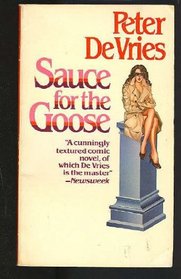DeVries (1910 - 1993) had his heyday as a popular writer of comic novels from about 1956 (Comfort Me with Apples) to the early 1970s (Mrs. Wallop), after which his writing probably suffered from the typical shock of turning sixty, âWhat the hell is happening? Could you tell me what is happening? What the hell?â
This comic novel is from 1981, so it feels dated in 2018 naturally, but one wonders if it felt dated even in 1981. Its view of âWomen's Libâ seems cantankerous, though DeVries had sympathy for women and their dealing with the nonsense and rubbish that men routinely fork out. He also tosses around the n-word in way that makes us wince in 2020, though one suspects that DeVries wasn't a racist, casual or otherwise.
As in many comic novels, the beginning is the high point, with the heroine comparing dull rustic Terra Haute with the fleshpots of Grand Rapids. The plot, however, never takes off. The best thing going for the book is DeVries' dazzling way with words. On Thomas Wolfe's Of Time and the River: âa fat slob of a book.â On diction: âYou can't be happy with a woman who pronounces both d's in Wednesday.â
This comic novel is from 1981, so it feels dated in 2018 naturally, but one wonders if it felt dated even in 1981. Its view of âWomen's Libâ seems cantankerous, though DeVries had sympathy for women and their dealing with the nonsense and rubbish that men routinely fork out. He also tosses around the n-word in way that makes us wince in 2020, though one suspects that DeVries wasn't a racist, casual or otherwise.
As in many comic novels, the beginning is the high point, with the heroine comparing dull rustic Terra Haute with the fleshpots of Grand Rapids. The plot, however, never takes off. The best thing going for the book is DeVries' dazzling way with words. On Thomas Wolfe's Of Time and the River: âa fat slob of a book.â On diction: âYou can't be happy with a woman who pronounces both d's in Wednesday.â




